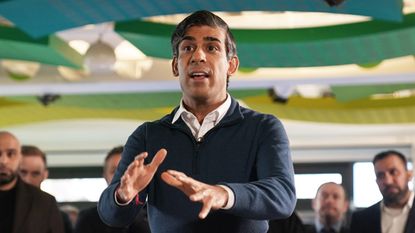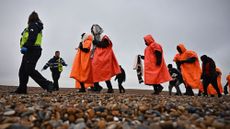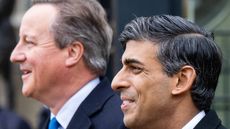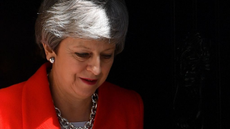When will the next UK general election happen?
Mid-October is most likely option, but PM could wait until December and hope for a Christmas miracle

Rishi Sunak is still refusing to say when he will call a general election, with most political commentators expecting it in October or November.
The prime minister faces "mounting pressure" to finally name a date after "bottling" calling one on the same day as the local elections in May, said the Mirror.
Chancellor Jeremy Hunt fuelled speculation of an autumn election when he mentioned the possibility of it being in October when discussing plans for the government's next spending review, said the BBC.
Subscribe to The Week
Escape your echo chamber. Get the facts behind the news, plus analysis from multiple perspectives.

Sign up for The Week's Free Newsletters
From our morning news briefing to a weekly Good News Newsletter, get the best of The Week delivered directly to your inbox.
From our morning news briefing to a weekly Good News Newsletter, get the best of The Week delivered directly to your inbox.
Sunak is "believed to want to hold on until the autumn," agreed the Mirror, "but there is speculation he could be ousted by his own party before then" so may decide to go to the country earlier.
What has Rishi Sunak said about a general election?
"Speculation has been rife" this year about when the prime minister will call the next general election, said the i news site.
In January, during a visit to a youth centre in Mansfield, Nottinghamshire, Sunak said his "working assumption" was that there would be a general election "in the second half of this year".
Last week he ruled out a general election on 2 May, when local and mayoral elections are already taking place across the country.
How is the next general election date chosen?
According to the Dissolution and Calling of Parliament Act, the current Parliament will be automatically dissolved on 17 December 2024, five years after it first met, unless an election is called earlier by the prime minister. The latest the next general election could be held would be 28 January 2025.
From 2011, the House of Commons had control over when an election would take place, but this was changed after the 2019 election, restoring the power of the prime minister to call elections at a time of their choosing.
When will he call one?
With Labour consistently 20 points ahead in the polls, Downing Street insiders have insisted the prime minister was always more likely to call a general election in the autumn, in the hope that "lower inflation, tax cuts and – hopefully – lower interest rates" can give his party a fighting chance, said the Financial Times.
"The government may seem to everyone else to already be in extra time, but it won't feel that way in Downing Street", said Henry Hill in The Guardian. An autumn election would give Sunak "two years on the job", the first of which he arguably spent "steadying the ship after Liz Truss".
Prime ministers generally avoid campaigning over the summer recess, "and the government has been advised by the security services for it not to clash with the US presidential election on 5 November", said The New Statesman's associate political editor Rachel Cuncliffe.
An October or November election therefore remains "the most reasonable baseline scenario", said Hill. An election then would be "late enough to make use of the time remaining in this parliament, but not so late as to ruin Christmas and drag voters to the polls in January".
It was reported last year by The Sunday Times that Tory election chief Isaac Levido has pencilled in polling day for 14 November. This would allow both the major parties to hold their annual conferences as normal, and "would even give Sunak the chance to announce it during his keynote speech", said the i news site.
A Downing Street source told The Independent that a November election was a "non-starter" because of "the noise a US election would generate likely drowning out any Tory messaging in the final weeks of campaigning". The news site reported that 10 October has been pencilled in for the poll date, while others have speculated 17 October as the most likely option, although this would mean cancelling the lucrative conference season.
If Sunak really wanted to leave it to the last minute he could opt for 12 December, the date of the last general election in 2019. "One of the pros of picking December is that it would give the chancellor time to squeeze in one more Autumn Statement before polling day which could include some pre-election sweeteners such as tax cuts and extra investment," said the i news site.
Create an account with the same email registered to your subscription to unlock access.
Sign up for Today's Best Articles in your inbox
A free daily email with the biggest news stories of the day – and the best features from TheWeek.com
Sorcha Bradley is a writer at The Week and a regular on “The Week Unwrapped” podcast. She worked at The Week magazine for a year and a half before taking up her current role with the digital team, where she mostly covers UK current affairs and politics. Before joining The Week, Sorcha worked at slow-news start-up Tortoise Media. She has also written for Sky News, The Sunday Times, the London Evening Standard and Grazia magazine, among other publications. She has a master’s in newspaper journalism from City, University of London, where she specialised in political journalism.
-
 Major League Baseball is facing an epidemic of pitcher's injuries
Major League Baseball is facing an epidemic of pitcher's injuriesUnder the Radar Many insiders are blaming the pitch clock for the rise in injuries — but the league is not so sure
By Justin Klawans, The Week US Published
-
 8 movie musicals that prove the screen can share the stage
8 movie musicals that prove the screen can share the stageThe Week Recommends The singing and dancing, bigger than life itself
By Scott Hocker, The Week US Published
-
2024 Mother's Day Gift Guide
The Week Recommends A present for every mom
By Catherine Garcia, The Week US Published
-
 Rwanda plan: Home Office launches surprise sweep to fill first flights
Rwanda plan: Home Office launches surprise sweep to fill first flightsSpeed Read Lib Dem spokesman condemns 'cruel gimmick', but Sunak says plan is already having deterrent effect
By Arion McNicoll, The Week UK Published
-
 Mark Menzies: Tories investigate MP after 'bad people' cash claims
Mark Menzies: Tories investigate MP after 'bad people' cash claimsSpeed Read Fylde MP will sit as an independent while party looks into allegations he misused campaign funds on medical expenses and blackmail pay-out
By Arion McNicoll, The Week UK Published
-
 Liz Truss to save the West: is a political comeback really on the cards?
Liz Truss to save the West: is a political comeback really on the cards?Talking Point The former prime minister is back with a new tell-all memoir
By Richard Windsor, The Week UK Published
-
 Is David Cameron overshadowing Rishi Sunak?
Is David Cameron overshadowing Rishi Sunak?Talking Point Current PM faces 'thorny dilemma' as predecessor enjoys return to world stage
By The Week UK Published
-
 How will honeytrap scandal change Westminster?
How will honeytrap scandal change Westminster?Today's Big Question Security procedures laid bare by spear phishing attack as focus shifts to 'political insider' being responsible
By The Week UK Published
-
 New coalition goes after the mighty lobbying power of AIPAC
New coalition goes after the mighty lobbying power of AIPACTalking Points Reject AIPAC, a collection of more than 20 progressive groups, works to shield lawmakers critical of Israel's war on Gaza
By Rafi Schwartz, The Week US Published
-
 Will Aukus pact survive a second Trump presidency?
Will Aukus pact survive a second Trump presidency?Today's Big Question US, UK and Australia seek to expand 'game-changer' defence partnership ahead of Republican's possible return to White House
By Sorcha Bradley, The Week UK Published
-
 Farewell to Theresa May: a PM consumed by Brexit
Farewell to Theresa May: a PM consumed by BrexitTalking Point Maidenhead MP standing down at next general election
By The Week UK Published